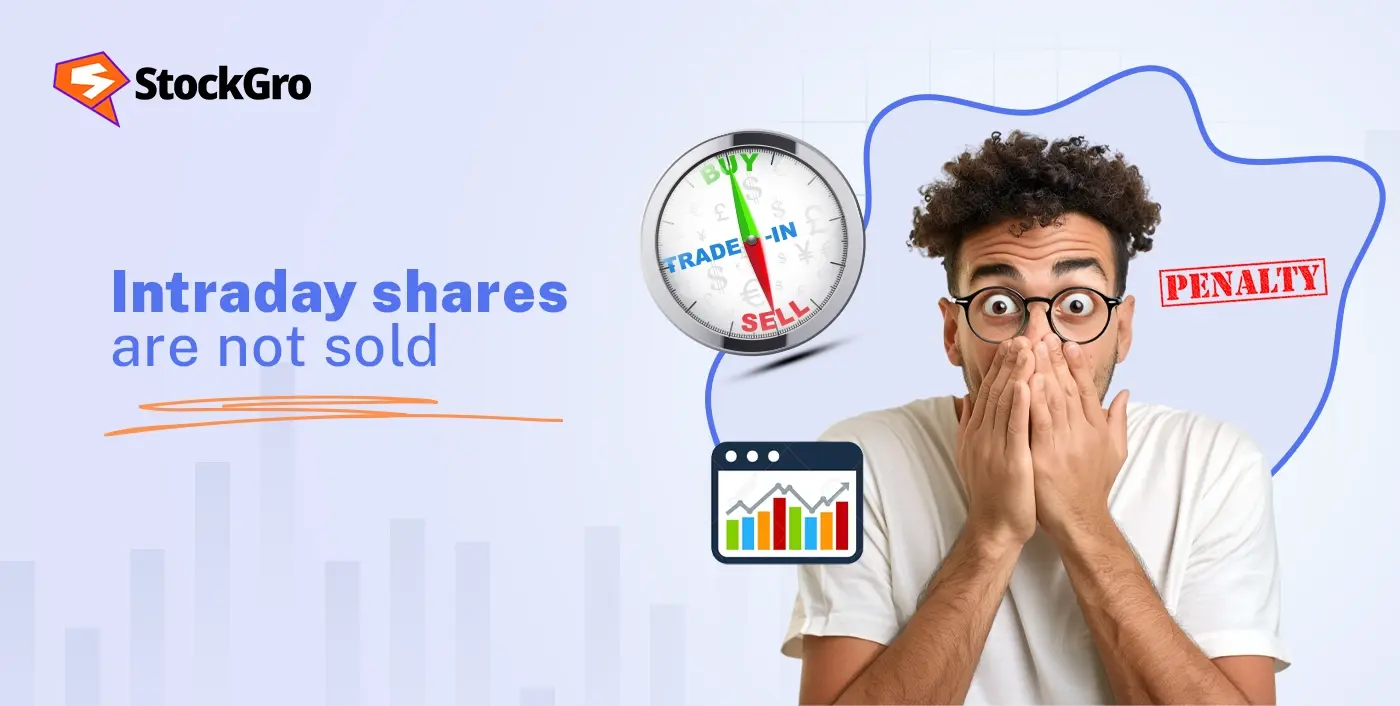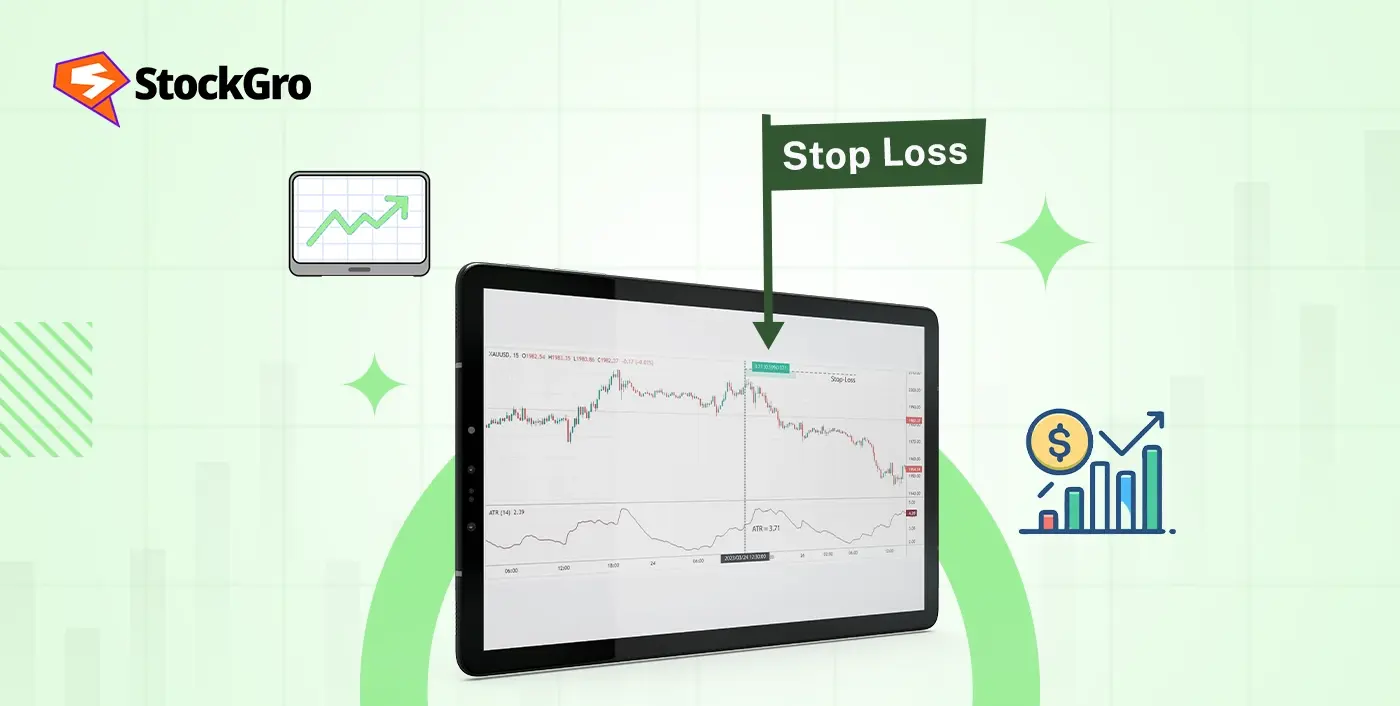
Traders often chase profits even after 3:00 pm in a hope that the trend will reverse. They end up not selling it before the closing window period. So what actually happens when you forget to sell? Does the broker square it off without asking? Let’s walk you through what happens if intraday shares are not sold before 3:30 pm.
What Happens If Intraday Shares Are Not Sold?
If intraday shares are not sold, your broker will automatically square off your intraday position, which may lead to a loss due to market volatility. Traders who do intraday trading must buy or sell their shares on the same day. But if they do not sell their invested amount might be affected. Here’s what will happen:
1. Immediate outcome: auto square-off
Brokers watch intraday trades as the clock nears closing time. So, if you haven’t exited your position by 3:15 to 3:20 PM, the broker will automatically close the trade. But why does that happen? That’s because intraday trading runs on borrowed funds. The margin you get from your broker isn’t meant to carry into the next day.
So, they punch in a market order to sell your holdings (or buy back your short position). The system takes the best available price at that exact moment. Sometimes you may get a good grade profit. Other times, the price may be far from what you expected. Some brokers might begin squaring off early if the market looks too volatile.
2. If auto square-off fails
Here’s what happens if intraday shares are not sold and the auto square-off fails:
- Low liquidity: There aren’t enough buyers or sellers when it’s time to exit.
- Stock hits a circuit limit: Trading might get affected if the price touches its daily upper or lower limit.
So, if you have enough cash in your account, these shares are converted to delivery and remain in your demat account.
But if you have built up a strong position, brokers try to fix the situation via auction. The auction price is usually higher than what you sold it for. The broker follows this method to protect the buyer on the other side of your trade.
3. Consequences of conversion to delivery
What if you have bought shares expecting to sell them on time, but couldn’t? Another method brokers follow is converting it to a delivery trade (CNC). You won’t face penalties, and the shares will get credited to your demat account after the standard settlement cycle (T+1 or T+2, depending on the stock/exchange). This only works if your broker sees enough free margin to cover the full trade value.
Moreover, your broker can’t deliver shares on your behalf unless the money is there. So if your margin was only good for intraday, the trade fails to convert. Now, brokers auto-liquidate your position on the next trading day. This may happen at unfavourable prices, especially if the market opens lower. Depending on your broker’s policy, you could also incur penalties, interest, or extra charges.
4. Penalties and charges
Most brokers auto-square off but take a fee per position. To know the exact policy, traders must know it and check with the respective brokers. The exchange will pay you if you shorted a stock and failed to buy it back. Until it’s settled, your margin gets blocked.
The broker might also auto-convert and then charge daily interest on the deficit. Rates vary, but some charge 18–24% annually on pending dues.
5. Special scenarios
Here is what happens if intraday shares are not sold in the special scenarios:
- If you don’t get the buyers or sellers near market close, your position may remain open. It will risk forced delivery or auction.
- If a stock hits the upper or lower circuit, your open position will have no chance to exit.
- The trader who fails to meet margin calls or square off might suffer steeper penalties than equities. This is common in futures and options trading.
Tips to avoid this situation
Failing to exit a position on time can lead to forced delivery, margin calls, and penalties. Let’s understand what intraday trading strategies you must follow:
- Trading platforms allow you to set price-based or time-based alerts. Use them to track your intraday trades well before the market closes and 15–30 minutes earlier.
- Every broker has a specific auto square-off cut-off between 3:10 PM and 3:20 PM. If your position isn’t closed by then, the broker forcibly squares it off, but with charges.
- Always verify your cash collateral and margin utilisation if you’re trading large positions.
- Check the stock’s average daily volume and circuit limit range before entering.
- Avoid highly volatile scrips during the result season, pre-market spikes, or bulk deal rumours.
Conclusion
So, now you know what happens if intraday shares are not sold before the market closes. Your broker takes charge and closes the trade automatically. But if the stock hits a circuit or there’s poor liquidity, auto square-off might not work. The shares may be converted to delivery if your account has enough cash for long positions.
FAQs
Most brokers allow manual conversion of intraday positions to delivery before 3:00 PM. You’ll need enough funds in your account to cover the full cost of the shares. If you’re short-selling, forget it, as delivery conversion isn’t allowed there.
Absolutely. When intraday shares are not sold and the stock price moves near market close, your broker’s auto square-off might give you big losses. They’ll exit your position at whatever price the market offers. And since auto square-offs usually happen during low liquidity, slippage is common.
Auto square-off isn’t free. Brokers charge double the regular intraday brokerage or a flat penalty fee. Add the applicable taxes and transaction charges, and your minor profit can vanish in fees alone. So, one must always check the fees with the broker before opening a demat account and start intraday trading.
Intraday trading typically occurs during regular market hours:
Indian stock market: 9:15 AM to 3:30 PM (Monday to Friday).
If you forget to sell intraday shares, your positions will be automatically squared off by your broker before the market closes to avoid any delivery-based settlement, which can lead to penalties.
No, intraday shares must be sold on the same day. If you don’t sell them by the market close, the broker will square off the position, and it will be considered a delivery trade, which may attract additional charges.
Auto square-off charges are fees imposed by brokers if they close your position on your behalf, due to failure to sell the position before market closing. These charges vary by broker but typically range from ₹20 to ₹50 per order. Always check with your broker for specific details.

